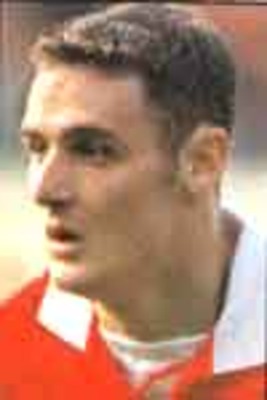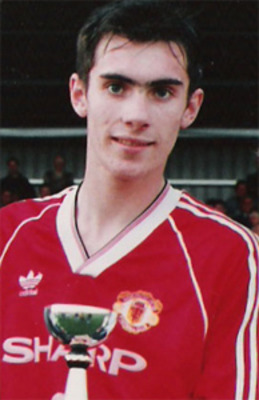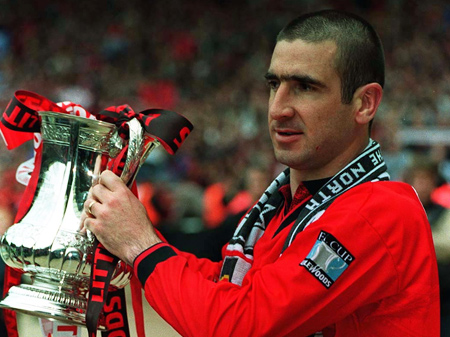Signed from: Blackburn Rovers (£1,200,000), July 1994
Debut: 2-0 win vs Queens Park Rangers, August 20th 1994
League Record: 68 games (+17 as sub), 6 goals
Sold to: Burnley (free transfer), summer 2003
With Steve Bruce well into his mid 30s, Ferguson’s first attempt to find a replacement at centre back was David May.
Like Brucie, May was an uncomplicated player. As a child, he’d supported Manchester City and went for a trials. However, he felt their approach to young players wasn't for him, and he headed North to the more homely Blackburn Rovers, at the time going nowhere fast in the old Second Division. By the time local businessman Jack Walker’s millions had pushed them into the top flight in 1992, May was established alongside ex-United star Kevin Moran at the back and they finished runners-up to us in 1993/94.
All the same, it was still a surprise (to me, at least) when he was given the chance to return to Manchester. Initially played at right back, he lost out to the emergence of Gary Neville and he didn't become a regular starter until 1996/97, after Bruce had wandered off to Birmingham City. To his credit, May was in fine form, chipping in with the odd goal and getting a call up to the England squad.
However, injuries then cost him a first team place, and he was pushed further out by the signings of further defenders with a more sophisticated style than May’s typically English blood-and-guts approach. In the treble season, he barely featured at all until the last few weeks, where (to his credit) he came in and did a steady job. To save players for the Champions League final, he started in the FA Cup final and helped us to a easy 2-0 win over Newcastle.
He was, apparently, under consideration to start the CL final due to suspensions to others, but in the end only made the bench, which resulted in him picking up a medal despite not playing any European football that season. His lasting legacy remains his crafty positioning of himself in the pictures of celebrations from this game (see above), and that season ensured United fans had the chant “David May, superstar/got more medals than Shearer” – two league championships, two FA Cups and a Champions League medal, for the record.
After that, he was restricted to no more than a couple of showings a season due to a series of injuries. By the time he was finally shunted out to Burnley, he was 33 and had been kept around a bit too long. By all accounts, something of a Jack the Lad in his younger days, he currently co-hosts a show on MUTV.
Sunday, 18 November 2012
Wednesday, 14 November 2012
53. Colin McKee
Signed from: Youth team
Debut: 0-0 draw vs Coventry City, May 8th 1994
League Record: That was his only game.
Sold to: Kilmarnock (with Neil Whitworth for a combined £350,000), September 1994
Not much to say about Colin - I certainly don't remember him as anything but a regular scorer for the reserves.
He got his one run out in an end of season dead rubber notable only for being the last time Bryan Robson played at Old Trafford. Returning to his native Scotland, a three year spell at Kilmarnock was followed by a series of short-term spells at several small Scottish clubs, never playing more than a handful of games at any, and he retired from the game in 2001.
52. Ben Thornley
Signed from: youth team
Debut: 2-2 draw vs West Ham United (as sub), February 26th 1994League Record: One game (+8 as sub)
Sold to: Huddersfield Town (free transfer), May 1998
The first (but certainly not the last) of the “Class of 1992” to appear here who didn’t end up with lengthy career at United, Ben Thornley picked up many positive notices, but was never helped by the fact he played left wing – a position more than aptly covered by Ryan Giggs and Lee Sharpe.
His chances dived even further when his leg was broken not long after his debut in a reserve game against Blackburn - he later sued the other player involved, a matter settled out of court. That pretty much ended any real progression, though the fact he was still in the squad as late as 1998 would suggest Fergie had some faith in him working out. But it was not to be, and he was packed off to Huddersfield Town. Though the team looked an outside bet for the Premier League at one point, they were instead relegated in 2001 and Thornley left to play over the border for Aberdeen. From there, it was a disappointing slide into the lower divisions and eventually the non-league, leaving us with a sad sense of a talent lost through matters out of the player's control.
Apropos of nothing, his brother has worked as a masseur to the England national team.
Sunday, 11 November 2012
51. Roy Keane
Signed from: Nottingham Forest (£3,750,000),
Debut: 2-0 win vs Norwich City, August 15th 1993.
League Record: 309 games (+17 as sub), 33 goals
Sold to: contract terminated (November 2005), subsequently signed for Celtic
A legend, though he probably wouldn't like me saying that. With Bryan Robson finally approaching the end of the road, we signed possibly the only man capable to taking over the same role. I'm not sure anybody in this list will come close to the levels Roy Keane strived to achieve his goals on the field: he didn't care about making friends or being liked by anyone – all that mattered was victory.
Despite the fact he would eventually become one of the most highly-regarded players in world football, young Roy was a late starter. At 19, he was still playing in his native Cork before Brian Clough brought him over to Nottingham Forest. Months later, he played in the 1991 FA Cup final, though ended up on the losing side.
By 1993, though, Clough had lost his battle with the bottle and Forest were relegated. Keane was ambitious and wanted to be playing at the highest level: Blackburn (at that time) matched that level of ambition and he looked nailed on to join them until a last-minute Fergie swoop saw him come to the right side of the A666. His joining us would be immortalised in the terrace classic ‘Keano’s Magic Hat’.
With the departure of Paul Ince in 1995, Keano was free to establish total dominance of the midfield, a position he would maintain for the best part of a decade, and when Eric retired in 1997, he took over the captaincy too. In this role, he took a more traditional approach – offering bollocings to teammates when they were needed and inspiring through sheer drive and energy.
His importance to the team was reflected in his first season as skipper, when a serious long-term injury resulted in a serious tilt at the title running out of steam. He came back the next year stronger and hungrier for missing out - leading to his greatest moment in a red shirt.
It was the 1999 Champions League semi-final against Juventus, who at that time had stars like Davids, Zidane and Del Piero at the top of their game. The first leg at Old Trafford had ended 1-1 and within no time at their place, we were 2-0 down and looking dead. Keano had had enough, took charge and scored the first goal in our 3-2 comeback. What made this more remarkable was that he picked up a booking that meant he would miss the final, but instead of moping, he played harder and better than ever.
The attitude and commitment that saw him win so much at United also led to one of his most infamous moments, when prior to the 2002 World Cup, he criticised the training facilities organised for the Irish team. Convinced management saw the whole affair as little more than a jolly, he stormed out after a bust-up with manager Mick McCarthy. Around the same time, he criticised sections of the United support of just turning up for the experience and not getting behind the team. A lot of the traditional fanbase found it hard to argue.
Three years later, his forthright views got him in trouble again. After we took a 4-1 kicking at Middlesbrough, he went on the in-house TV channel and laid into various players, not holding back one bit. Ferguson found this unacceptable and the subsequent rift between the two led to his leaving the club. To give Keane his dues, everything he said was spot on and he later stated he went to each player he criticised and explained why he said what he had. Though he was past his peak at the time, he was still the captain and a major influence on the team and we've not had that kind of box-to-box midfielder since.
Following managerial spells at Sunderland (mixed fortunes) and Ipswich Town (not good), he’s currently seen as a pundit for ITV’s coverage of England and Champions League games, where he’s often amusing with his usual straight talking.
Monday, 5 November 2012
50. Keith Gillespie
Signed from: Youth team
Debut: 2-0 win vs Bury (FA Cup tie), January 5th 1993. Scored onceLeague Record: Three games (+6 as sub), one goal
Sold to: Newcastle United (valued at £1,000,000 in an exchange deal), January 1995
Direct winger in the old fashioned tradition (i.e. he kept running at the full back, putting a cross in on the occasions he beat his man), Keith Gillespie scored on his debut and two years later got his only Premiership goal with a fine effort against Newcastle. They were obviously impressed as not long later he was playing for them.
I personally had high hopes for Gillespie and was disappointed to see him leave, more so when we sold Andrei Kanchelskis a few months later, as I'd not seen enough of David Beckham at that point to know he was more than capable of holding the right wing. What is interesting to wonder is that if Keith hadn't left United, whether he’d have got the chance on the right wing that was given to Beckham and making the late 90s a very different tale. Certainly his valuation of a million pounds was very high for a (relative) novice in 1995, and shows how much faith Keegan had in him.
He went on to have a fairly successful career in Geordieland and then Blackburn, where he teamed up with Mark Hughes, as well as being a regular for Northern Ireland. His last significant role was at Sheffield United, where he helped them gain promotion to the Premiership in 2006. While up there, he managed to get sent off within seconds of coming on as a sub, for elbowing an opposition player in the face while he ran into position. Bizarre.
Still playing in the League of Ireland as of 2012.
Sunday, 4 November 2012
49. Eric Cantona
Signed from: Leeds United (£1,200,000), November 1992
Debut: 2-1 win vs Manchester City (as sub), December 6th 1992
League Record: 142 games (+1 as sub), 64 goals
Sold to: Retired, summer of 1997
The beginning of time, for this fan. Recently, one Red Issue columnist commented on one of our current players praying before kick off by saying "there’s only one God round here, and his name is Eric". Damn right.
It’s strange to think that in early 1992, Eric Cantona was almost washed up. Though a French international, his temper had alienated him from several clubs in his homeland. Insulted by Sheffield Wednesday manager Trevor Francis’ request for a “trial”, he instead went to Leeds United, playing a minor (though subsequently exaggerated) role in their 1992 title win.
The Yorkshire fans took to Eric quickly – perhaps enjoying a bit of exotic flair alongside the likes of Lee Chapman and Chris Fairclough. He began the next season with a bang, scoring a hat trick in the Charity Shield against Liverpool and another triple (the first in the Premier League) against Spurs. But all was not well – Cantona’s individualism not mixing well with the rigid long ball game favoured by Howard Wilkinson.
Then came a fateful phone call in December 1992. Leeds contacted United about buying Denis Irwin (laughable, given they let him go for nothing in 1986), an obvious non-starter. However, either Alex Ferguson or United chairman Martin Edwards asked about Cantona – the word came back a deal might be on, and in quick time, United had a new forward.
His impact was close to instant. At the time, we were struggling in the league, not scoring enough goals and looking like the failure to clinch the title the year before has sucked the fight from the players. Eric came along and galvanised everything. Linking well with Mark Hughes, he was given the chance to express himself with a freedom denied to him before. It's not an exaggeration to say things clicked almost overnight, as we won eight of the ten games following his debut.
More importantly, Manchester welcomed the man with open arms and he felt right at home. United fans recognise genius when we see it, and in Eric we knew we had someone with that ability to do the complete unexpected, a player to make you gasp in a way we hadn't seen since for some years. So highly did we (still do) value him, that he became "The King", a title only given once before, to Denis Law. As much as his ability was his attitude - one of his team-mates described him as "collar turned up, back straight, chest stuck out, he glided into the arena as if he owned the fucking place". He was unlike most footballers, living in a modest semi-detached house, taking an interest in art and cinema and capable of conversations beyond the usual "over the moon" variety.
In the 1993/94 season, he got even better, scoring vital goals as we held onto the title and won the FA Cup as well - Eric scoring two penalties in our 4-0 smashing of Chelsea. Our team that season has gone down in some legend to representing the peak of attacking football in the Fergie years: with Giggs, Sharpe and Kanchelskis running riot on the wings, both scoring and providing many goals.
The next year seemed to be more of the same, until the famous night at Selhurst Park, when after being the subject of rough treatment from Crystal Palace defender Richard Shaw, Eric lashed out and was sent off by the referee. Trudging off the field, a Palace fan elected to charge down the stand shouting abuse only to be met with a flying kick from the King. For this, he was banned for nine months and United's season resulted in zilch.
It was a strange time for us, and when Hughes, Ince and Kanchelskis were sold off that summer, some of us questioned Alex Ferguson's sanity. What we also didn't know at the time was that Eric was feeling fed up and almost ready to quit: it took a visit from Fergie to Paris to convince him to return to Manchester.
And how glad we would be that he did. Made captain of a team where the likes of Gary Neville, Nicky Butt and David Beckham were now regulars, he was a strong influence and led from example: at the climax of the campaign we had a run where we seemed to win most games 1-0 with the goal from Eric. He repeated this trick in the cup final, slamming in a late winner against Liverpool in a moment that won't be forgotten by reds anywhere.
The next season, though we won the league again, he didn't seem quite himself. Perhaps at 31, he realised he wasn't at his peak anymore. His retirement that summer was a huge shock, but in hindsight I can only respect his decision. He'd fallen out of love with the game and wanted to go do all other things with his life. In four and a half years, he'd helped turn a club of under-achievers into the most dominant club in England. There have been players before and after who have had more talent, but very few have won the hearts of the fans as much as Eric.
Nowadays, he’s continuing to develop his acting skills on stage and screen (including the brilliant Looking For Eric) and working towards getting New York Cosmos back off the ground. And he’s still the sexiest fucker who walks the Earth.
Subscribe to:
Comments (Atom)





